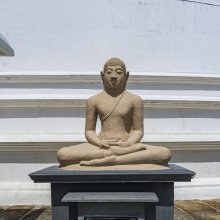Dina, Dīna, Dinā, Dīnā, Ḍīna, Ḍiṅa, Ḍina, Ḍīṅa: 31 definitions
Introduction:
Dina means something in Hinduism, Sanskrit, Buddhism, Pali, the history of ancient India, Marathi, Jainism, Prakrit, Hindi, biology. If you want to know the exact meaning, history, etymology or English translation of this term then check out the descriptions on this page. Add your comment or reference to a book if you want to contribute to this summary article.
Alternative spellings of this word include Deen.
Images (photo gallery)
(+10 more images available)
In Hinduism
Shaivism (Shaiva philosophy)
Source: Wisdom Library: Kubjikāmata-tantraDinā (दिना, “day”):—Sixth of the eight Mātṛs born from the body of Bhānumatī, according to the Kubjikāmata-tantra. These eight sub-manifestations (mātṛ), including Dinā, embody several qualities expressive of the sun’s burning heat and glaring light. They are presided over by the Bhairava Ruru. Bhānumatī is the sixth of the Eight Mahāmātṛs, residing within the Mātṛcakra (third of the five cakras) and represents the sun.
Source: Brill: Śaivism and the Tantric TraditionsDina (दिन) refers to a “day” (i.e., ‘day-to-day activities of Śaiva-initiates’), according to the Kiraṇatantra chapter 31.—Accordingly, “Garuḍa spoke: ‘What are the day-to-day [i.e., dina—dine dine] activities of the neophyte (samayī) and the putraka? Tell me this. You have not taught me the [regular rules of] behaviour (caryā) before’”.

Shaiva (शैव, śaiva) or Shaivism (śaivism) represents a tradition of Hinduism worshiping Shiva as the supreme being. Closely related to Shaktism, Shaiva literature includes a range of scriptures, including Tantras, while the root of this tradition may be traced back to the ancient Vedas.
Natyashastra (theatrics and dramaturgy)
Source: Wisdom Library: Nāṭya-śāstraDīnā (दीना, “pitiable”) refers to a specific “glance” (dṛṣṭi), according to the Nāṭyaśāstra chapter 8. This is a type of glance that expresses the ‘dominant state’ (sthāyibhāva) of sorrow (śoka). There are a total thirty-six glances defined.
Source: archive.org: Natya ShastraDīnā (दीना).—A type of glance (dṛṣṭi) expressing a dominant state (sthāyibhāva);—The Glance in which the lower eyelid is slightly fallen, eyeballs are slightly swollen, and which is moving very slowly, is called Dīnā (pitiable); it is used in sorrow.

Natyashastra (नाट्यशास्त्र, nāṭyaśāstra) refers to both the ancient Indian tradition (shastra) of performing arts, (natya—theatrics, drama, dance, music), as well as the name of a Sanskrit work dealing with these subjects. It also teaches the rules for composing Dramatic plays (nataka), construction and performance of Theater, and Poetic works (kavya).
Jyotisha (astronomy and astrology)
Source: Wisdom Library: Brihat Samhita by VarahamihiraDina (दिन) refers to a “day”, according to the Bṛhatsaṃhitā (chapter 11), an encyclopedic Sanskrit work written by Varāhamihira mainly focusing on the science of ancient Indian astronomy astronomy (Jyotiṣa).—Accordingly, “Śveta Ketu is a comet which appears in the east about midnight with its tail pointing to the south. Ka Ketu is a comet of the shape of a carriage pole and appears in the west. Both the above Ketus are seen simultaneously for 7 days [i.e., sapta-dina-dṛśya]. If both should appear glossy, there will be prosperity and happiness in the land; if the Ka Ketu should be visible for over 7 days, there will be much suffering from wars for ten years”.
Source: Wikibooks (hi): Sanskrit Technical TermsDina (दिन).—Day. Note: Dina is a Sanskrit technical term used in ancient Indian sciences such as Astronomy, Mathematics and Geometry.

Jyotisha (ज्योतिष, jyotiṣa or jyotish) refers to ‘astronomy’ or “Vedic astrology” and represents the fifth of the six Vedangas (additional sciences to be studied along with the Vedas). Jyotisha concerns itself with the study and prediction of the movements of celestial bodies, in order to calculate the auspicious time for rituals and ceremonies.
Pancaratra (worship of Nārāyaṇa)
Source: eScholarship: Chapters 1-14 of the Hayasirsa PancaratraDīna (दीन) refers to “one who is depressed”, representing an undesirable characteristic of an Ācārya, according to the 9th-century Hayaśīrṣa-pañcarātra Ādikāṇḍa chapter 3.—The Lord said:—“I will tell you about the Sthāpakas endowed with perverse qualities. He should not construct a temple with those who are avoided in this Tantra. [...] He should not be very dark, without compassion, a sinner, nor emaciated, short or lazy, he should not be injured, uncultured, agitated and not depressed (dīna). [...] A god enshrined by any of these named above (viz., dīna), is in no manner a giver of fruit. If a building for Viṣṇu is made anywhere by these excluded types (viz., dīna) then that temple will not give rise to enjoyment and liberation and will yield no reward, of this there is no doubt”.

Pancaratra (पाञ्चरात्र, pāñcarātra) represents a tradition of Hinduism where Narayana is revered and worshipped. Closeley related to Vaishnavism, the Pancaratra literature includes various Agamas and tantras incorporating many Vaishnava philosophies.
Purana and Itihasa (epic history)
Source: archive.org: Shiva Purana - English TranslationDīna (दीन) refers to “poor and needy persons”, according to the Śivapurāṇa 2.2.17. Accordingly as Brahmā narrated to Nārada:—“[...] the parents [of Satī] who obtained the news through her friends were very glad and celebrated a great festival (Paramotsava). The noble Dakṣa gave as much wealth to Brahmins as they desired. The noble Vīriṇī gave similar gifts to the blind, the poor and the needy [viz., dīna]. Vīriṇī embraced her daughter on the head and delightfully praised her frequently”.

The Purana (पुराण, purāṇas) refers to Sanskrit literature preserving ancient India’s vast cultural history, including historical legends, religious ceremonies, various arts and sciences. The eighteen mahapuranas total over 400,000 shlokas (metrical couplets) and date to at least several centuries BCE.
Ayurveda (science of life)
Source: archive.org: Vagbhata’s Ashtanga Hridaya Samhita (first 5 chapters)Dina (दिन) refers to “during the day”, and is mentioned in verse 2.1 of the Aṣṭāṅgahṛdayasaṃhitā (Sūtrasthāna) by Vāgbhaṭa.—Dina (“during the day”) has been paraphrased by ñin re-źiṅ (“during every day”); cf. 1.35. The same expression recurs in 3.2, where CD read ñin re bźin, and in mDzaṅs-blun p. 82.8, where Schiefner (Erganzungen p. 21), with reference to p. 82.3, wants to write ñin re bźin too; here the Petersburg Kanjur, whose provenance has not yet been established beyond doubt (see Ch’en, HJAS is p. 57), offers ñin re-re instead.

Āyurveda (आयुर्वेद, ayurveda) is a branch of Indian science dealing with medicine, herbalism, taxology, anatomy, surgery, alchemy and related topics. Traditional practice of Āyurveda in ancient India dates back to at least the first millenium BC. Literature is commonly written in Sanskrit using various poetic metres.
Ganitashastra (Mathematics and Algebra)
Source: archive.org: Hindu MathematicsDina (दिन) represents the number 15 (fifteen) in the “word-numeral system” (bhūtasaṃkhyā), which was used in Sanskrit texts dealing with astronomy, mathematics, metrics, as well as in the dates of inscriptions and manuscripts in ancient Indian literature.—A system of expressing numbers by means of words arranged as in the place-value notation was developed and perfected in India in the early centuries of the Christian era. In this system the numerals [e.g., 15—dina] are expressed by names of things, beings or concepts, which, naturally or in accordance with the teaching of the Śāstras, connote numbers.

Ganitashastra (शिल्पशास्त्र, gaṇitaśāstra) refers to the ancient Indian science of mathematics, algebra, number theory, arithmetic, etc. Closely allied with astronomy, both were commonly taught and studied in universities, even since the 1st millennium BCE. Ganita-shastra also includes ritualistic math-books such as the Shulba-sutras.
Yoga (school of philosophy)
Source: ORA: Amanaska (king of all yogas): A Critical Edition and Annotated Translation by Jason BirchDina (दिन) refers to a “day”, according to the Amanaska Yoga treatise dealing with meditation, absorption, yogic powers and liberation.—Accordingly, as Īśvara says to Vāmadeva: “[...] [Now], I shall define the nature of that highest, mind-free absorption which arises for those devoted to constant practice. [...] Remaining in absorption for the [following] times; moments, breaths, Palas, Nāḍīs, Praharas, days (dina), months and years, [the Yogin] then goes to the highest reality. [...]”.

Yoga is originally considered a branch of Hindu philosophy (astika), but both ancient and modern Yoga combine the physical, mental and spiritual. Yoga teaches various physical techniques also known as āsanas (postures), used for various purposes (eg., meditation, contemplation, relaxation).
India history and geography
Source: Cologne Digital Sanskrit Dictionaries: Indian Epigraphical GlossaryDina.—(CII 3), a day; used to denote the solar, or more properly civil, day. See also di and divasa. (IE 7-1-2), ‘fifteen’. Note: dina is defined in the “Indian epigraphical glossary” as it can be found on ancient inscriptions commonly written in Sanskrit, Prakrit or Dravidian languages.
Source: Singhi Jain Series: Ratnaprabha-suri’s Kuvalayamala-katha (history)Dīṇa (दीण) refers to “extreme poor” and was commonly found in the city of Mathurā at some point in time in ancient India, according to Uddyotanasūri in his 8th-century Kuvalayamālā (a Prakrit Campū, similar to Kāvya poetry).—The Kuvalayamala (779 A.D.) is full of cultural material which gains in value because of the firm date of its composition. [...] On page 55.11 f., there is a description of poor home (aṇāha-maṇḍava) in the city of Mathurā. In its population there was a sprinkling of disabled persons: [e.g., Extreme poor (dīṇa)] [...]. The invaders of the orphan home exchange their views as to which sin may be washed at which holy place. [...]

The history of India traces the identification of countries, villages, towns and other regions of India, as well as mythology, zoology, royal dynasties, rulers, tribes, local festivities and traditions and regional languages. Ancient India enjoyed religious freedom and encourages the path of Dharma, a concept common to Buddhism, Hinduism, and Jainism.
Biology (plants and animals)
Source: Google Books: CRC World Dictionary (Regional names)Dina in Senegal is the name of a plant defined with Dalbergia melanoxylon in various botanical sources. This page contains potential references in Ayurveda, modern medicine, and other folk traditions or local practices It has the synonym Amerimnon stocksii (Benth.) Kuntze (among others).
Example references for further research on medicinal uses or toxicity (see latin names for full list):
· Revisio Generum Plantarum (1891)
If you are looking for specific details regarding Dina, for example health benefits, chemical composition, side effects, pregnancy safety, diet and recipes, extract dosage, have a look at these references.

This sections includes definitions from the five kingdoms of living things: Animals, Plants, Fungi, Protists and Monera. It will include both the official binomial nomenclature (scientific names usually in Latin) as well as regional spellings and variants.
Languages of India and abroad
Pali-English dictionary
Source: BuddhaSasana: Concise Pali-English Dictionarydina : (nt.) day.
Source: Sutta: The Pali Text Society's Pali-English DictionaryDīna, (adj.) (Sk. dīna) poor, miserable, wretched; base, mean, low D.II, 202 (?) (°māna; v. l. ninnamāna); J.V, 448; VI, 375; Pv.II, 82 (=adānajjhāsaya PvA.107); IV, 81; Miln.406; PvA.120 (=kapaṇa), 260 (id.), 153; Sdhp.188, 324. (Page 323)
— or —
Dina, (nt.) (Sk. dina; Lat. nun-dinae (*noven-dinom); Oir. denus; Goth. sin-teins; cp. divasa) day Sdhp.239. —duddinaṃ darkness Dāvs.V, 50 (d. sudinaṃ ahosi, cp. I.49, 51); also as f. duddinī Vin.I, 3. (Page 322)

Pali is the language of the Tipiṭaka, which is the sacred canon of Theravāda Buddhism and contains much of the Buddha’s speech. Closeley related to Sanskrit, both languages are used interchangeably between religions.
Marathi-English dictionary
Source: DDSA: The Molesworth Marathi and English Dictionarydina (दिन).—m n (S) A day.
--- OR ---
dīna (दीन).—a (S) Humble, suppliant, submissive. 2 Piteous, lowly, gentle, meek;--used of accents or tones, gestures or looks. 3 S Poor, indigent, needy.
--- OR ---
dīna (दीन).—m ( A) The Muhammadan faith. This is the war-cry, the encouraging shout on engaging (or on rushing to any deed of violence).
Source: DDSA: The Aryabhusan school dictionary, Marathi-Englishdina (दिन).—
--- OR ---
dīna (दीन).—a Humble, supplicant, submissive. Piteous, lowly, gentle, meek. Poor, needy.
Marathi is an Indo-European language having over 70 million native speakers people in (predominantly) Maharashtra India. Marathi, like many other Indo-Aryan languages, evolved from early forms of Prakrit, which itself is a subset of Sanskrit, one of the most ancient languages of the world.
Sanskrit dictionary
Source: DDSA: The practical Sanskrit-English dictionaryDina (दिन).—[dyuti tamaḥ, do dī vā nak hrasva; Uṇādi-sūtra 2.49.]
1) Day (opp. rātri); दिनान्ते निहितं तेजः सवित्रेव हुताशनः (dinānte nihitaṃ tejaḥ savitreva hutāśanaḥ) R.4.1; यामिनयन्ति दिनानि च सुखदुःखवशीकृते मनसि (yāminayanti dināni ca sukhaduḥkhavaśīkṛte manasi) K.P.1; दिनान्ते निलयाय गन्तुम् (dinānte nilayāya gantum) R.2.15.
2) A day (including the night), a period of 24 hours; दिने दिने सा परिवर्धमाना (dine dine sā parivardhamānā) Kumārasambhava 1.25; सप्त व्यतीयुस्त्रिगुणानि तस्य दिनानि (sapta vyatīyustriguṇāni tasya dināni) R.2.25.
Derivable forms: dinaḥ (दिनः).
See also (synonyms): dinam.
--- OR ---
Ḍīna (डीन).—p. p. [ḍī-kta] Flown up.
-nam The flight of a bird. The varieties of the flight of birds are said to be 11, the word prefixed to डीन (ḍīna) showing the particular mode of flight; e. g. अवडीनम्, उड्डीनम्, प्रडीनम्, अभिडीनम्, विडीनम्, परिडीनम्, पराडीनम् (avaḍīnam, uḍḍīnam, praḍīnam, abhiḍīnam, viḍīnam, pariḍīnam, parāḍīnam) &c. See Mahābhārata (Bombay) 8.41.26-28.
--- OR ---
Dīna (दीन).—a. [dī-kta tasya na]
1) Poor, indigent.
2) Distressed, ruined, afflicted, miserable, wretched.
3) Sorry, dejected, melancholy, sad; सा विरहे तव दीना (sā virahe tava dīnā) Gītagovinda 4.
4) Timid, frightened.
5) Mean, piteous; यं यं पश्यसि तस्य तस्य पुरतो मा ब्रूहि दीनं वचः (yaṃ yaṃ paśyasi tasya tasya purato mā brūhi dīnaṃ vacaḥ) Bhartṛhari 2.51.
-naḥ A poor person, one in distress or misery; दीनानां कल्पवृक्षः (dīnānāṃ kalpavṛkṣaḥ) Mṛcchakaṭika 1.48; दिनानि दीनोद्धरणोचितस्य (dināni dīnoddharaṇocitasya) R.2.25.
-nam Distress, wretchedness.
-nā The female of a mouse or shrew.
Source: Cologne Digital Sanskrit Dictionaries: Shabda-Sagara Sanskrit-English Dictionary
Ḍīna (डीन).—n.
(-naṃ) Flying, the flight of a bird, to go. E. ḍī to fly, bhvāve kta .
--- OR ---
Dina (दिन).—mn.
(-naḥ-naṃ) A day. E. dī to waste, nak affix, and the vowel made short; or do to destroy, (darkness,) kinan Unadi aff.
--- OR ---
Dīna (दीन).—mfn.
(-naḥ-nā-naṃ) 1. Poor, indigent, needy, distressed. 2. Afraid, frightened, timid. f.
(-nā) A mouse or shrew. E. dī to waste or decay, affix kta, deriv. irr. or dī as before, Unadi affix nak .
Source: Cologne Digital Sanskrit Dictionaries: Benfey Sanskrit-English DictionaryDina (दिन).—i. e. div + an + a, m. and n. Day, [Mānavadharmaśāstra] 11, 144.
Source: Cologne Digital Sanskrit Dictionaries: Cappeller Sanskrit-English DictionaryḌīna (डीन).—[neuter] flying, flight (of a bird).
--- OR ---
Dina (दिन).—1. v. 3 dā.
--- OR ---
Dina (दिन).—2. [neuter] day.
--- OR ---
Dīna (दीन).—[adjective] scarce, scanty, weak, feeble ([abstract] tā [feminine]); depressed, sad, wretched, [neuter] as [abstract] & [adverb] (also dīnakam).
Source: Cologne Digital Sanskrit Dictionaries: Monier-Williams Sanskrit-English Dictionary1) Ḍīna (डीन):—[from ḍī] mfn. (cf. [Pāṇini 7-2, 14; viii, 2, 45; Kāśikā-vṛtti]) flown, flying, [Horace H. Wilson]
2) [v.s. ...] n. a bird’s flight, [Mahābhārata viii, 1899 f.]
3) [v.s. ...] cf. ati-, abhi-, ava-, ni-, nir-, parā-, pari-, punar-, etc.
4) Dina (दिन):—1. dina mfn. (√do) cut, divided, mowed, [Ṛg-veda viii, 67, 10] (cf. svayaṃ-).
5) 2. dina (√3. dā). See a-saṃ-
6) 3. dina (accented only, [Naighaṇṭuka, commented on by Yāska i, 9]) mn. ([gana] ardharcādi, only occurring as n.) a day, [Manu-smṛti; Raghuvaṃśa; Pañcatantra] etc. (ifc. also in Vedic texts) ifc. f(ā). , [Rājataraṅgiṇī i, 347.]
7) cf. [Latin] peren-dinus, nUndinus etc.; Got. sin-teins; Lit. dëna; O.[proper] [accusative] sg. deinan; [Slavonic or Slavonian] dṛnī.
8) Dīna (दीन):—[from dī] a mfn. ([from] √3. di?) scarce, scanty, [Ṛg-veda]
9) [v.s. ...] depressed, afflicted, timid, sad
10) [v.s. ...] miserable, wretched, [Manu-smṛti; Mahābhārata; Kāvya literature] etc.
11) [from dī] n. distress, wretchedness, [Harivaṃśa; Pañcatantra]
12) [v.s. ...] Tabernamontana Coronaria, [cf. Lexicographers, esp. such as amarasiṃha, halāyudha, hemacandra, etc.]
13) Dīnā (दीना):—[from dīna > dī] f. the female of a mouse or shrew, [cf. Lexicographers, esp. such as amarasiṃha, halāyudha, hemacandra, etc.]
14) Dīna (दीन):—b mfn. See under √3. dī.
Source: Cologne Digital Sanskrit Dictionaries: Yates Sanskrit-English Dictionary1) Ḍīna (डीन):—(naṃ) 1. n. Flying.
2) Dina (दिन):—[(naḥ-naṃ)] 1. m. n. A day.
3) [karā-tma-jā (jā)] 1. f. The Jamnā.
4) Dīna (दीन):—[(naḥ-nā-naṃ) a.] Poor; afraid. f. A mouse or shrew.
Source: DDSA: Paia-sadda-mahannavo; a comprehensive Prakrit Hindi dictionary (S)Dīna (दीन) in the Sanskrit language is related to the Prakrit word: Dīṇa.
[Sanskrit to German]
Sanskrit, also spelled संस्कृतम् (saṃskṛtam), is an ancient language of India commonly seen as the grandmother of the Indo-European language family (even English!). Closely allied with Prakrit and Pali, Sanskrit is more exhaustive in both grammar and terms and has the most extensive collection of literature in the world, greatly surpassing its sister-languages Greek and Latin.
Hindi dictionary
Source: DDSA: A practical Hindi-English dictionary1) Dina (दिन) [Also spelled din]:—(nm) a day (comprised of twenty-four hours from sunrise to sunrise); a day (extending from sunrise to sunset), day-time; time(s); ~[kara/maṇi] the sun; —[daśā] (adverisity or favourableness of) times; •[kharāba honā] to be under a cloud, to fall on bad days; —[dina/—ba-dina] day by day, from day to day, daily, with the passage of time; ~[māna] duration of the day; time interval between sunrise and sunset; —[rāta/raina] day and night, always, all the time; ~[śeṣa] evening; [dināṃta] the close of the day, sunset; [dināṃdha] day-blind; •[tā] dayblindness; [dināgama] day-break, morning; [dināraṃbha] day-break, beginning of the day; —[kaṭanā] to be marking time, to be dragging out one’s days; to be passing a life of pain and sorrow; —[kāṭanā] to drag out one’s days, to maintain oneself somehow; to survive hardship; —[ko tāre dikhanā, —ko tāre najara ānā] to have the stars dance before one’s eyes (by a blow etc.); to be thoroughly beaten up; —[ko tāre dikhānā] to make stars dance before one’s eyes (by a blow etc.); to beat up thoroughly; to put in a very tight corner; —[ko dina rāta ko rāta na samajhanā] to be completely lost in work; to take no notice of the passage of time; —[ko para kahanā] to reverse the truth; —[gaṃvānā] to waste time, to while away time; —[ginanā] to pass uneventful days, to keep on waiting from day to day; —[caḍhanā] the day to be far advanced, the sun to have gone up in the sky; to pass beyond the time (of menstruation); —[caḍhe] late in the morning, when the day is far advanced; —[chipānā] the sun to set; —[ḍhalanā] the day to come to a close; the sun to start declining; —[ḍhale] at eventide, late in the afternoon; —[dahāḍe] in broad daylight; —[dūnā rāta caugunā baḍhanā] to grow by leaps and bounds; —[dharanā] to appoint a day (for some auspicious ceremony etc.); —[pahāḍa honā] the time to hang heavy; —[pūre karanā] to mark time; to pass one’s days somehow; —[pūre honā] to be gone full time; to have completed the period of gestation; —[phiranā/bahuranā] the times to take a favourable turn, prosperous phase of life to commence; -[bhara] all day, through out the day; —[bhārī honā] see —[pahāḍa honā; —laganā] to give oneself airs; to become vain; —[lada jānā] (one’s) heydays to be gone/past; —[se] while yet day, during the daytime; [dinoṃ kā phera] run of (good) luck to be changed.
2) Dīna (दीन) [Also spelled deen]:—(a) poor, miserable, humble, arousing a sense of compassion; (nm) religion; -[īmāna] religion and morality; ~[dayālu] kind and considerate to the poor; an epithet of God; ~[dāra] religious-minded, devout; —[duniyā] this world and the other world; —[dharma] religion and morality; ~[baṃdhu] a helper of the poor, compassionate; an epithet of God; ~[vastala] see ~[dayālu].
...
Prakrit-English dictionary
Source: DDSA: Paia-sadda-mahannavo; a comprehensive Prakrit Hindi dictionaryDīṇa (दीण) in the Prakrit language is related to the Sanskrit word: Dīna.
Prakrit is an ancient language closely associated with both Pali and Sanskrit. Jain literature is often composed in this language or sub-dialects, such as the Agamas and their commentaries which are written in Ardhamagadhi and Maharashtri Prakrit. The earliest extant texts can be dated to as early as the 4th century BCE although core portions might be older.
Kannada-English dictionary
Source: Alar: Kannada-English corpusḌīna (ಡೀನ):—[adjective] flown or moved in the sky.
--- OR ---
Ḍīna (ಡೀನ):—[noun] the act, manner or power of flying or moving through space; flight.
--- OR ---
Dina (ದಿನ):—
1) [noun] the time between sunrise and subsequent sunset; a day.
2) [noun] the period of approx. twenty four hours, taken by the earth to make one rotation on its axis; a mean solar day.
3) [noun] a division of time equal to the time elapsed between two consecutive returns of the same terrestrial meridian to the sun (ಸೌರದಿನ [sauradina]) a solar day.
4) [noun] a division of time equal to twenty four hours but reckoned from one midnight to the next.
5) [noun] the day on which ceremonies are performed for one’s deceased ancestor.
6) [noun] the period of one’s reign, administration, etc.
7) [noun] the portion of a day allotted to work (as eight or nine hours work); work-day.
8) [noun] a particular time or period (as days of youth).
9) [noun] a fixed daily allowance or allotment of food or provisions; ration.
10) [noun] an opportune or propitious day or time.
11) [noun] (arith.) a symbol of for the number thirty.
12) [noun] ದಿನಮೀರು [dinamiru] dina mīru (the time fixed for something) to elapse; ದಿನರಾತ್ರಿ [dinaratri] dina rātri day and night; whole day (of trwenty four hours); ದಿನ ಲೆಕ್ಕಹಾಕು [dina lekkahaku] dina lekka hāku to count the number of days; 2. to expect death shortly; to be in the last days of one’s life; ದಿನವಾಗು [dinavagu] dinavāgu = ದಿನ ತುಂಬು [dina tumbu]; ದಿನವಿಳಿ [dinavili] diniviḷi (the day) to come to close; (sunlight) to start dwindle (in the evening); ದಿನವೇರು [dinaveru] dinavēru (the sunlight) to become brighter, warmer; (time) to elapse since the sunrise; ದಿನಶುದ್ಧಿ [dinashuddhi] dina śuddhi propitiousness or auspiciousness of the day; ದಿನ ಸಾಗು [dina sagu] dina sāgu (days, time) to pass; 2. (daily life) to carry on; ದಿನ ಹಾಕು [dina haku] dina hāku (daily life) to be carried on; ದಿನಂದಿನ [dinamdina] dinandina = ದಿನೇದಿನೇ [dinedine]; ದಿನದಿನ [dinadina] 0dinadina = ದಿನೇದಿನೇ [dinedine]; ದಿನದಿನಂ [dinadinam] dinadinam = ದಿನೇದಿನೇ [dinedine]; ದಿನಾದಿನಾ [dinadina] dinādinā= ದಿನೇದಿನೇ [dinedine]; ದಿನೇದಿನೇ [dinedine] dinē dinē every day; 2. day by day; ದಿನ ಎಣಿಸು [dina enisu] dina eṇisu to be in the last days of one’s life; to expect death shortly; ದಿನಂದಪ್ಪದೆ [dinamdappade] dinamdappade every day; regularly; ದಿನಂಪ್ರತಿ [dinamprati] dinam prati every day; regularly; ದಿನ ಕೂಡಿಬರು [dina kudibaru] dina kūḍibaru (a propitious time, opportunity) to happen; ದಿನ ಕೂಡು [dina kudu] dina kūḍu = ದಿನ ಕೂಡಿಬರು [dina kudibaru]; ದಿನಕ್ರಮವಾಗಿ [dinakramavagi] dina kramavāgi = ದಿನಕ್ರಮೇಣ [dinakramena]; ದಿನಕ್ರಮೇಣ [dinakramena] dina kramēṇa day by day; as days pass by; ದಿನಗಟ್ಟಲೆ [dinagattale] dinagaṭṭale of or relating to everyday life; 2. for days together; for a number of days; ದಿನಗಟ್ಲೆ [dinagatle] dinagaṭle = ದಿನಗಟ್ಟಲೆ [dinagattale]; ದಿನ ಗೊತ್ತುಮಾಡು [dina gottumadu] dina gottu māḍu to fix a day (esp. auspicious one to initiate a work, for a marriage etc.); ದಿನ ತಪ್ಪಿ ದಿನ [dina tappi dina] dina tappi dina every alternative day; ದಿನ ತಳ್ಳು [dina tallu] dina taḷḷu to spend days or time (usu. idly or postponing doing something); ದಿನ ತುಂಬು [dina tumbu] dina tumbu (the time for giving birth to a child) to come; ದಿನದಂತೆ [dinadamte] dinadante as usual; ದಿನದಿನಕೆ [dinadinake] dina dinake = ದಿನಕ್ರಮೇಣ [dinakramena]; ದಿನದಿನಕ್ಕೆ [dinadinakke] dina dinakke = ದಿನಕ್ರಮೇಣ [dinakramena]; ದಿನದೊಳಗೆ ಬೀಳು [dinadolage bilu] dinadoḷage bīḷu = ದಿನ ತುಂಬು [dina tumbu]; ದಿನ ನಡೆ [dina nade] dina naḍe (day to day life) to be carried on; ದಿನ ನಿತ್ಯ [dina nitya] dina nitya every day; ದಿನ ನಿಶ್ಚಯಿಸು [dina nishcayisu] dina niścayisu = ದಿನ ಗೊತ್ತುಮಾಡು [dina gottumadu]; ದಿನ ನೂಕು [dina nuku] dina nūku = ದಿನ ತಳ್ಳು [dina tallu]; 2. to lead a very difficult, wretched life; ದಿನ ನೋಡು [dina nodu] dina nōḍu to look for an auspicious or appropriate time; ದಿನಪಡಿ [dinapadi] dina paḍi a quantity of provisions given to a person for preparing his or her day’s food; ದಿನ ಬಿಟ್ಟು ದಿನ [dina bittu dina] dina biṭṭu dina every alternative day; 2. day by day; ದಿನಬೆಳಗೂ [dinabelagu] dina beḷagū every day; 2. the whole day; throughout the day; ದಿನಮಾಡು [dinamadu] dina māḍu to perform ritual ceremony for one’s deceased parent; ದಿನಾ [dina] dinā = ದಿನಾಗಲೂ [dinagalu]; ದಿನಾಗಲೂ [dinagalu] dināglū everyday; ದಿನಾಲು [dinalu] dinālu = ದಿನಾಗಲೂ [dinagalu]; ದಿನಾಲೂ [dinalu] dinālū = ದಿನಾಗಲೂ [dinagalu].
--- OR ---
Dīna (ದೀನ):—
1) [adjective] low in rank, condition or position; lowly.
2) [adjective] lacking material possessions; having little or no means to support oneself; poor.
3) [adjective] distressed; suffering.
4) [adjective] spoiled; damaged; injured.
5) [adjective] greedy; avaricious; covetous.
6) [adjective] frightened; apprehensive; scared.
7) [adjective] not strong; weak.
8) [adjective] modest; not self-assertive; humble.
--- OR ---
Dīna (ದೀನ):—
1) [noun] a poor, needy or destitute man.
2) [noun] the state of being distressed; suffering; misery.
3) [noun] a greedy, stingy man; a miser.
Kannada is a Dravidian language (as opposed to the Indo-European language family) mainly spoken in the southwestern region of India.
See also (Relevant definitions)
Starts with (+254): Dina tali, Dina-dinai, Dinabala, Dinabalake, Dinabalve, Dinabandha, Dinabandhu, Dinabhari, Dinabhartar, Dinabhartri, Dinabhaskara, Dinabhatya, Dinabhavadhyaya, Dinacalana, Dinacandrika, Dinacarane, Dinacari, Dinacariya, Dinacarya, Dinacaryaphala.
Ends with (+239): Abadina, Abhidina, Abhishavadina, Addina, Addina, Adhadina, Adhidina, Adhikadina, Adina, Adyadina, Ajadina, Akaladurdina, Allapadina, Allavadina, Alpadina, Angarakadina, Angavvodina, Anishtadina, Anudina, Anupadina.
Full-text (+484): Dinamukha, Daina, Di, Dinarambha, Dinadi, Dinakrit, Dinaka, Dinamani, Dinaprani, Vishuvadina, Dinadhisha, Gatadinam, Pratidinam, Paridina, Samdina, Dinagama, Dinakara, Dinam, Dinacarya, Durdina.
Relevant text
Search found 54 books and stories containing Dina, Dīna, Dinā, Dīnā, Ḍīna, Ḍiṅa, Ḍina, Ḍīṅa, Dīṇa; (plurals include: Dinas, Dīnas, Dinās, Dīnās, Ḍīnas, Ḍiṅas, Ḍinas, Ḍīṅas, Dīṇas). You can also click to the full overview containing English textual excerpts. Below are direct links for the most relevant articles:
Garga Samhita (English) (by Danavir Goswami)
Verse 6.9.25 < [Chapter 9 - The Arrival of Śrī Dvārakā]
Verse 5.6.4 < [Chapter 6 - Seeing Śrī Mathurā]
Verse 5.4.6 < [Chapter 4 - The Journey to Śrī Mathurā]
Rig Veda (translation and commentary) (by H. H. Wilson)
Brihad Bhagavatamrita (commentary) (by Śrī Śrīmad Bhaktivedānta Nārāyana Gosvāmī Mahārāja)
Verse 2.2.120 < [Chapter 2 - Jñāna (knowledge)]
Verse 2.1.181 < [Chapter 1 - Vairāgya (renunciation)]
Verse 2.4.125 < [Chapter 4 - Vaikuṇṭha (the spiritual world)]
Sahitya-kaumudi by Baladeva Vidyabhushana (by Gaurapada Dāsa)
Text 10.33 < [Chapter 10 - Ornaments of Meaning]
Text 4.74 < [Chapter 4 - First-rate Poetry]
Text 9.20 [Yamaka] < [Chapter 9 - Ornaments of Sound]
Bhakti-rasamrta-sindhu (by Śrīla Rūpa Gosvāmī)
Verse 1.2.225 < [Part 2 - Devotional Service in Practice (sādhana-bhakti)]
Verse 3.3.16 < [Part 3 - Fraternal Devotion (sakhya-rasa)]
Verse 3.2.177 < [Part 2 - Affection and Service (dāsya-rasa)]





